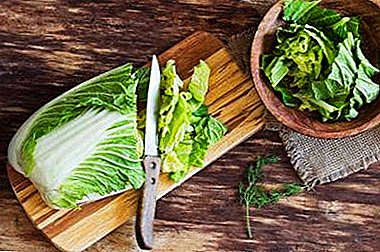
Cauliflower is an affordable, very tasty and extremely healthy vegetable. And if raw cauliflower is not to everyone’s taste, then very few people can refuse from cauliflower soup or baked cauliflower with cheddar.
Cauliflower got its name due to its delicate buds. It is these flowers - the heads are eaten. In Britain there is a saying: “The most beautiful flowers are cauliflower flowers.” Vegetable is quite popular in England. In Russia, it is not so popular, and in vain. After all, cauliflower contains a huge amount of minerals, amino acids, vitamins. Just the same storehouse of beneficial trace elements. But there are contraindications.
What harm can this vegetable cause?
Of course, nutritionists recommend eating cauliflower as often as possible. But in each product there are substances that affect each organ individually.
In the acute stages of diseases of the gastrointestinal tract, the vegetable can aggravate the condition, leading to vomiting, nausea, colic, bloating. When eating cabbage, epithelial organs of the gastrointestinal tract become inflamed.. This causes pain, worsening the general condition of the patient.
When can I use?
Cauliflower has been bred not one century ago, but has not yet been fully investigated. Clearly defined beneficial properties and their effects on the human body. But, based on the facts and practical knowledge, we can safely say when it is possible to use cabbage, and when it is not necessary.
Indications for the use of cauliflower:
 Vegetable is eaten to prevent atherosclerosis.
Vegetable is eaten to prevent atherosclerosis.- Fiber affects the digestion process, helps to cleanse the body of toxins and toxins.
- Cauliflower lowers unwanted blood cholesterol. It normalizes the quantitative component of lipids.
- As a result of the presence in the composition of fatty acids and vitamins, cabbage has anti-inflammatory properties. Neutralizes toxins.
- The high content of vitamin C strengthens the immune system, inhibits the aging process, has a positive effect on the central nervous system.
- Thanks to nutrients, the course of a chemical reaction is accelerated, the metabolism occurs faster.
- If a pregnant woman eats cauliflower, the risk of improper development of the fetus is significantly reduced.
- The presence of potassium is important for the heart, it normalizes heart rate and blood pressure.
- Another component - molybdenum is useful for tooth enamel.
- The advantage of cabbage is to maintain a sufficient level of glucose in the body, which is especially important for diabetes.
- Biotin contained in vegetables, prevents the development of inflammatory processes in the skin. Reduces the risk of dermatitis, fungal infections, seborrhea.
- With regular use of cauliflower, you can avoid the appearance of cancer.Glucosinolate is a component of cabbage, which in combination with other substances in the body is transformed into isothiocyanate.
Such a qualitative transformation contributes to a significant reduction of cancer cells and slowing the growth of malignant tumors.
- Vegetable is also useful for high-quality work of the brain.
- Revealed a positive effect on the organs of vision, prevents the development of cataracts.
 Contraindications for cauliflower:
Contraindications for cauliflower:
- diseases of the intestine, stomach, pancreas in the active phase of exacerbation;
- increased acidity of the stomach;
- intestinal cramps;
- gout;
- hypertension;
- with individual intolerance;
- thyroid problems;
- the postoperative period, when the sutures are located in the chest and abdomen;
- kidney disease.
Despite its amazing properties, cauliflower, if misused, can harm the body in the form of various side effects. In order to avoid this, it is necessary to treat with all care the contraindications and norms for the use of the product.
Can I eat a vegetable for some diseases or not?
Pancreatitis
With a diagnosed pancreatitis, a diet is mandatory to reduce the load on the pancreas. However, foods must be easily digestible, low-calorie, rich in vitamins and beneficial elements. These are the properties of cauliflower.
During the period of exacerbation of the disease the amount of cabbage consumed should be reduced. The maximum daily portion of not more than 100 grams, exclusively boiled or steamed. If a person eats cauliflower, and then experiences discomfort, it means that the vegetable should be excluded from the diet.
When gastritis
Gastritis is a disease in which the gastric mucosa suffers from inflammatory processes. Occurs with improper diet, alcohol abuse, defeat Helicobacter.
Gastroenterologists do not prohibit, and even insist on the use of cauliflower. After all, its rich composition regenerates the mucous membranes of the stomach, normalizes metabolism, increases the body's natural strength.
It should be remembered that the vegetable is contraindicated in people.:
- with high acidity;
- during the exacerbation of the disease;
- with hyperacid type of gastritis.
Gout
This type of cabbage is a forbidden product. After all, it contains purine compounds. They are the culprits of the disease. But there are opposing opinions. In any case, before use should consult a doctor.
With diabetes
 Diabetes mellitus occurs in two types, which even doctors often confuse.
Diabetes mellitus occurs in two types, which even doctors often confuse.
- Type 1 - the most severe chronic disease. The disease occurs when the immune system kills insulin, which is produced by the pancreas. As a result, the blood glucose level rises. It develops mainly in children and people up to 35 years.
Diabetics strictly monitor their diet. They can not products overloaded with carbohydrates, the less sugar, the better. Cauliflower contains a lot of vegetable protein and fiber, improves the production of enzymes, gives a long-term feeling of satiety. At the same time, the level of sugar after ingestion of food remains at the same level.
- With type 2 diabetes, there is no insulin deficiency.. It occurs in obese people after 40 years. In this case, the use of low-calorie foods. Cauliflower is such a vegetable. It contains a fairly large number of trace elements, almost all groups of vitamins, phytoncides.
They have a positive effect on the circulatory system, protect the body, weakened by diabetes. And sulforapan prevents the development of the disease, saving the cardiovascular system from complications.
With a stomach ulcer
Cauliflower is more preferable than white cabbage, as it has a delicate structure, it contains less coarse fiber and more proteins. Therefore, it is much better perceived by the stomach.
When an ulcer is advised to use fresh squeezed cabbage juice on an empty stomach, 100 ml per day. You can still eat stewed or boiled.
Is it weak or strong?
Vegetables are products that do not cause constipation.. In its composition cauliflower has a large amount of coarse fiber. These dietary fibers are practically not digested and create the bulk of fecal masses. The more of them, the easier for the intestine to move the masses to the exit, so the process of emptying occurs regularly and painlessly.
Also, cauliflower does not cause gas. Puree of this variety is especially useful to give young children. Due to the delicate structure of the fibers, the vegetable does not cause flatulence in the intestines. While the increased ability to gas has white cabbage.
- Recipes, as well as separate cooking variations for children.
- Use during breastfeeding and pregnancy.
- Proper introduction of vegetables in baby food.
- Calorie content, composition, health benefits and harm.
- Growing on seedlings.
- The best varieties of seeds for open ground.
Consequences of use in the presence of contraindications
 The amount of the consumed product, in the first place, affects the condition of the sick person. Perhaps the minimum amount will not bring anything bad, and when eating a lot of cauliflower at a time, this will definitely be felt.
The amount of the consumed product, in the first place, affects the condition of the sick person. Perhaps the minimum amount will not bring anything bad, and when eating a lot of cauliflower at a time, this will definitely be felt.
First of all, chronic diseases will worsen, the general condition will worsen, it is likely that acute pain will appear. People with contraindications cabbage can bring a number of complications and side effects..
Thus, cauliflower occupies its proper place in our kitchen. Sometimes you can and should pamper yourself with a tasty vegetable. But you should carefully treat it to people who have health problems, so as not to harm the body.


 Vegetable is eaten to prevent atherosclerosis.
Vegetable is eaten to prevent atherosclerosis.









